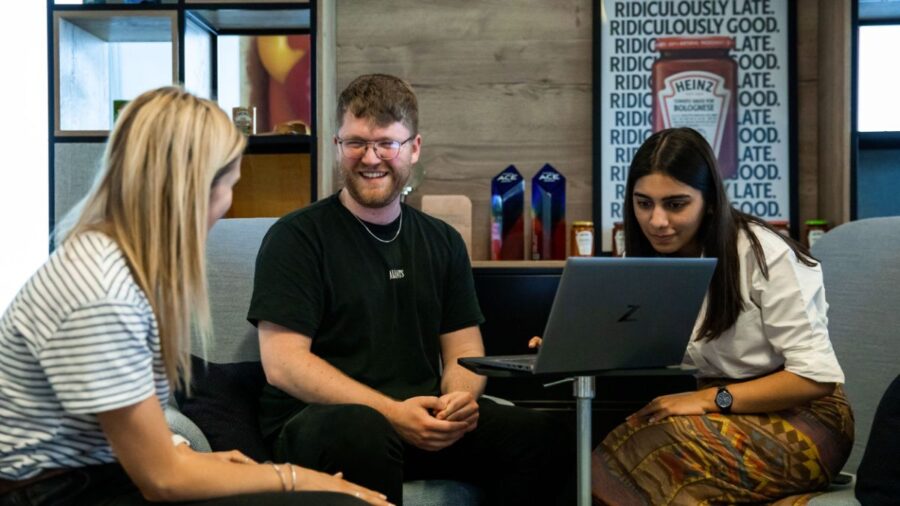-
Provided by

- Date published: Nov 6, 2023
- Categories
30-Second Summary:
- Rodolfo Camacho, Chief People Officer, International Zone, Kraft Heinz, acknowledges Gen-Z are bringing new demands for engaging skills development journeys
- Kraft Heinz has implemented an array of practices to support its culture of skills development, including its International Management and Manufacturing Trainee Program
- This approach as contributed to retention rates increasing over the past three years and Kraft Heinz achieving certification as a ‘Great Place to Work’
It’s another frantic Tuesday afternoon. Your calendar is stacked with meetings and your to-do list is growing with each email and message that pings through. Not to mention you’ve got to accept a delivery with no idea when the doorbell might ring. Scrambling from your last meeting, you see your next 30-minute window is a refresher training session on a topic you covered six months ago, on a technology that will be obsolete twelve months from now. Are you using that L&D session to brush up your skills, or letting the words wash over you as you type away in the background?
Challenge: New generations will not accept subpar skills development

This outdated and no doubt horribly familiar approach to learning & development does not work. It is static, unengaging, and falls a long way short of the expectations that Gen Z, among other cohorts, are placing on employers. 76% of Gen Zers are actively seeking more opportunities to learn or practice new skills at work. What’s more, they are no longer seeking one-off, classroom-based L&D that we know generates dwindling adoption rates and low levels of engagement. Kraft Heinz is on the pulse of this shift in generational expectations, with a new skills development offering that better engages and trains its employees.
Through new programs, a bespoke global learning hub, and a culture of non-linear career pathways, Kraft Heinz has tackled industry-wide frustrations with L&D, turning it into a strategic asset for the organization. Indeed, Kraft Heinz was recently certified as an official ‘Great Place to Work’ in 16 countries across its Zone, with 72% of employees in agreement. Rodolfo Camacho, Chief People Officer, International Zone, Kraft Heinz, speaks to HRD on the progress the organization has made on creating fluid skills development programs.
Solution: Meeting new expectations
The findings of the LinkedIn survey on Gen Z expectations indicate a generation that places a high value on opportunities to learn and develop not just for the here and now, but as a long-term investment for their career. “From what I see across Kraft Heinz, Gen Z is ambitious and unafraid to switch things up or learn something new,” agrees Camacho. “Which is exactly the attitude and approach we encourage in our talent.”
Although many organizations may share this sentiment, internal mobility rates across industries are low. So, how is Kraft Heinz empowering its employees to take on new roles and gather the skills they view as career-critical?
International Management and Manufacturing Trainee Program
“One of the ways we support this is by encouraging ‘job hopping’ within our own business,” explains Camacho. “For example, our International Management and Manufacturing Trainee Programme (IMMT) allows employees to travel to all areas of our organization, rotating between sales, marketing and operations.” This program gives trainees the opportunity to try out different functions, gain regular access to senior leadership, and get a taste of the various roles available to them.
Also included in the program is Kraft Heinz’s ‘New Disruptor Challenge.’ “It’s an opportunity for Trainees to work on a subject they’re passionate about”, says Camacho. “Progression at Kraft Heinz isn’t always linear. I started in trade marketing! We take big bets on people.”
Kraft Heinz leans on the competitive advantage of their global scale to support this culture of internal mobility. “If a person is talented, lives our values and has a willingness to learn, then we’ll do all we can to keep them in our business,” Camacho notes. “In some cases, that means looking at job opportunities in different functions and different markets – one of the many benefits that come with working in a global business.”
Ownerversity, coaching, and BRGs
Alongside training that may be more applicable for early career employees, Kraft Heinz runs a variety of practices to create a holistic set of skills development opportunities. In the pursuit of an employee-led and self-serve approach to L&D, employees also have access to a bespoke global learning hub, Ownerversity. “Ownerversity lets employees access everything from internally developed Functional Academies to resources like the Harvard Business Review,” explains Camacho. Employees can choose from a range of resources, be it one of the nine Functional Academies (including Finance, IT, and Procurement) or its Leadership and Culture Academy.
“We’re also responding to this by continuously improving our learning and development offerings through added ‘extras’ like coaching and situational leadership training,” adds Camacho. A suite of employee-led Business Resource Groups (BRGs) also support the learning experience, ranging from the Gender Equality Network (GEN), to The 57 (cultural awareness and employee connection) and Proudz (supporting LGBTQ+ employees).
Improving skills development opportunities increases retention and drives business impact

Although careful investment has long been a priority for Kraft Heinz, demographic shifts are increasing the need for high-quality skills development. The expectation for elite learning experiences throws a spotlight on L&D leaders. Those who fall short can expect negative impacts on HR and business-level metrics, including retention and engagement.
“We’ve always made these people investments, but they’re becoming increasingly important for the next generation of talent,” explains Camacho. The combination of programs and cultural support at Kraft Heinz gives people the space to find their passions and interests within the business. According to Camacho, it’s working. “Employee retention rates have increased steadily over the last three years,” he adds.
This approach also brings business-level benefits that are increasingly crucial as HR seeks to deliver great organizational value. “In turn,” Camacho continues, “We benefit from new ideas and perspectives that have a genuine impact on our business.”
Skills development: An ongoing journey
Part of Kraft Heinz’s journey to being recognized as a ‘Great Place to Work’ has been its ongoing commitment to feedback and iteration. It encourages employees to openly share feedback and ask questions via several key avenues including annual engagement surveys and focus groups. Quarterly Townhalls offer employees a platform to ask its international leadership team questions and get feedback, in real time.
“We’ve seen positive feedback related to ‘growth’ and ‘career’ in our engagement surveys increase steadily over the last three years, especially for employees in the early stages of their careers,” says Camacho.
This feedback has also pushed Kraft Heinz to further pursue function-agnostic career pathways to a greater extent. Camacho joins HRD Connect once again in an upcoming case study to examine this part of Kraft Heinz’s skills development journey in more detail.








